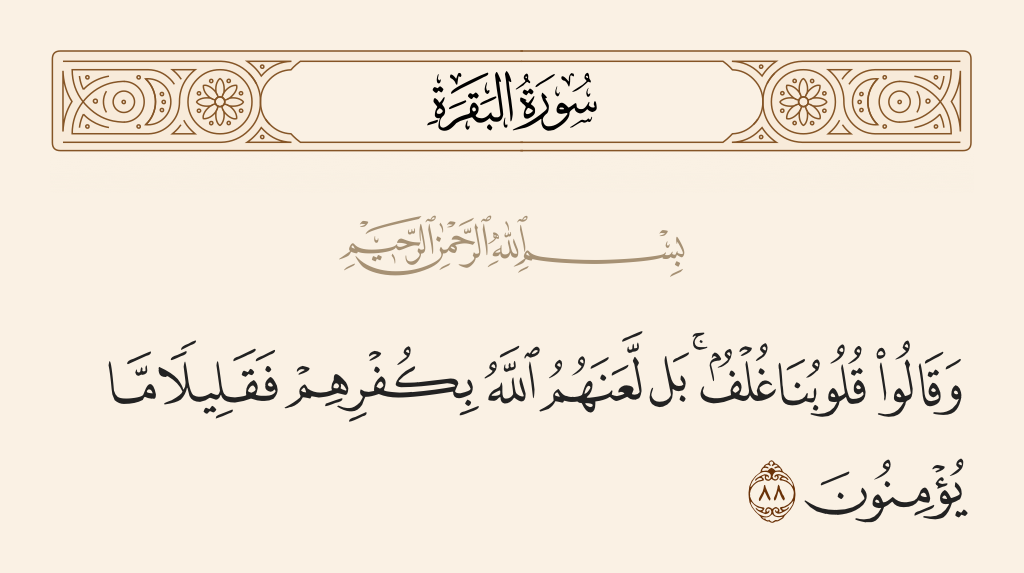Surat Al-Baqarah Verse No. 88: Reading and listening
Translation of the verse 88 from Surah Al-Baqarah : Number of verses 286 - - page 13 - Part 1.

﴾وَقَالُواْ قُلُوبُنَا غُلۡفُۢۚ بَل لَّعَنَهُمُ ٱللَّهُ بِكُفۡرِهِمۡ فَقَلِيلٗا مَّا يُؤۡمِنُونَ ﴿
[ البقرة: 88]
And they say, "Our hearts are wrapped (i.e. do not hear or understand Allah's Word)." Nay, Allah has cursed them for their disbelief, so little is that which they believe.
English - Sahih International
And they said, "Our hearts are wrapped." But, [in fact], Allah has cursed them for their disbelief, so little is it that they believe.
Tafheem-ul-Quran by Syed Abu-al-A'la Maududi
(2:88) They say, "Our hearts are secure." *94 Nay, the fact is that Allah has cursed them for their disbelief; so they are little disposed to believe.
Tafheem-ul-Quran by Syed Abu-al-A'la Maududi
*94). They said, in effect, that they were so staunch in their beliefs that their convictions would remain unaffected regardless of what was said. Such a claim is the hallmark of those bigots whose minds are seized by irrational prejudice. Nothing can be a matter of greater shame for human beings than the so-called firmness of conviction which they often boast of. What can be more foolish than adherence to inherited beliefs and convictions when their falseness is established by overwhelmingly strong arguments?
*95). Before the advent of the Prophet, the Jews were eagerly awaiting a Prophet whose coming had been prophesied by their own Prophets. In fact, the Jews used to pray for his advent so that the dominance of the unbelievers could come to an end and the age of their own dominance he ushered in. The people of Madina were witnesses to the fact that these same Jewish neighbours of theirs had yearned for the advent of such a Prophet. They often used to say: 'People may oppress us today as they wish, but when our awaited Prophet comes, we will settle our scores with our oppressors.'
Since the people of Madina had themselves heard such statements they were inclined to embrace the religion of the Prophet all the more readily lest their Jewist neighbours supersede them in acquiring this honour. It was therefore astonishing for them to find that when the promised Prophet did appear those same Jews who had so eagerly looked forward to welcoming him turned into his greatest enemies.
The statement 'and they recognized it' is confirmed by several contemporaneous events. The most authentic evidence in this connection is that of Safiyah, a wife of the Prophet, who was herself the daughter of one learned Jewish scholar (Huyayy b. Akhtab) and the niece of another (Abu Yasir). She says that when the Prophet migrated to Madina both her father and uncle went to meet him and conversed with him for quite a while. When they returned home, she heard the following conversation:
Uncle:Is he really the same Prophet whose advent has been prophesied in our Scriptures?
Father: By God, he is.
Uncle: Do you believe that?
Father: Yes..
Uncle. Then what do you intend to do?
Father: 1 will continue to oppose him and will not let his claim prevail as long as I live.
(Ibn Hishim, Sirah, eds., Mustafa al-Saqqa' et al., 2 vols., II edition, Cairo, 137511955, see vol. 1, pp. 518 f. See also Ibn IshAq, The Life of Muhammad, tr. and notes by A. Guillaume, London, Oxford University Press, 1955, pp. 241 f. - Ed.)